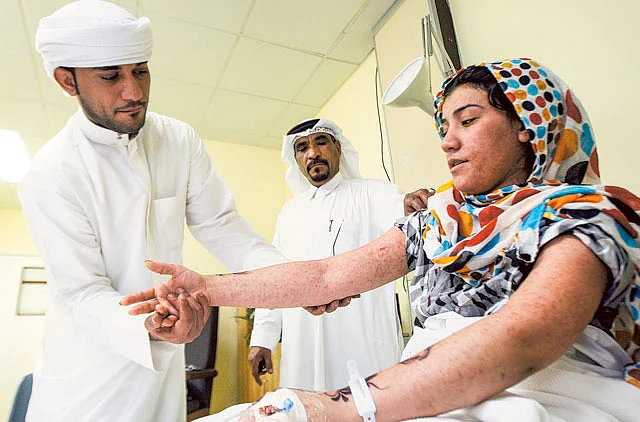Sharjah: A 21-year-old Arab woman identified as W.A, was admitted in the ICU at Al Qasimi Hospital a week after she applied black henna on her hands in an Ajman beauty saloon, the sister of the patient said on Wednesday.
Black henna often contains the chemical p-Phenylenediamine (PPD), which gives the natural reddish-brown dye a black tint, said Dr Shubhada Mandar Bichi, a specialist dermatologist and the patient’s doctor at the hospital. She said the patient suffered from severe allergic reactions from the black henna application.
“The woman was suffering from abdominal pain, breathing difficulty and dizziness when she was admitted to the hospital,” she said. “Prior to being admitted, she visited a private clinic in Sharjah that prescribed an injection for her pain.”
She explained that the chemical frequently is added to henna to speed up the dying process and produce a deeper stain on the skin. “It caused a negative reaction. Once the body’s immune system triggers an allergic reaction to PPD further exposure can be fatal. The patient will take another seven to ten days to recover and be discharged.”
Dr Bichi called on the authorities to ban black henna. “It is poisonous,” she said.
Dr Abdul Wahid Al Wahdi, Head of the General Surgery Section at Al Qasimi Hospital in Sharjah said black henna can cause irritation, burning, scarring, create sensitivity to certain medicines and trigger asthma and respiratory problems if inhaled. “Henna manufacturers add a chemical that could cause an allergic reaction on the skin.”
Condition worsened
The patient’s sister said: “My sister was in such a miserable condition. Her skin was completely swollen and weeping fluids. She was had a difficult time recognising us.”
She explained that the doctor at the private clinic gave her an injection that caused her sister’s condition to worsen. “The private clinic doctor said that five per cent of patients develop an adverse reaction after the injection; my sister was in that five per cent.”
The owner of the salon has visited the patient at the Al Qasimi hospital to check on her condition. She claims she has a licence from Ajman Municipality to use black henna and that the patient signed a consent form before the black henna application.
The Municipality will intervene only when an official police report is filed.
The patient said she had fever and that her skin reacted negatively after applying the black henna. “Yesterday was the first day I slept peacefully after days of pain.”
The risks of black henna are well known to regulators. The emirates of Dubai, Sharjah and Fujairah have banned its use; despite this it is available in many shops and saloons across the UAE.
Sign up for the Daily Briefing
Get the latest news and updates straight to your inbox
Network Links
GN StoreDownload our app
© Al Nisr Publishing LLC 2025. All rights reserved.
